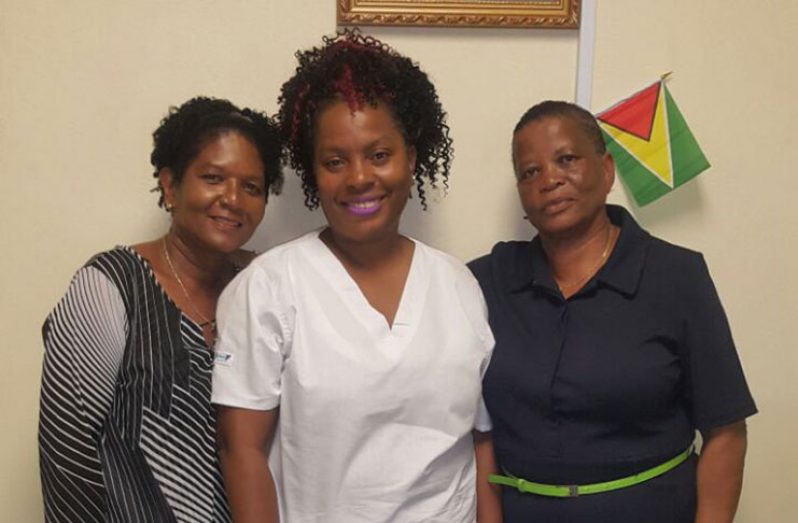By M Margaret Burke
MIDWIVES have been around throughout the ages. Like Shiphrah and Puah, midwives who were written about in the bible as playing major roles in saving lives, many others have spanned the lives of men and women for centuries and are now even more in demand today in every part of the world. Though in some primitive cultures, where there may be self-delivery of babies or by some other archaic mode, babies are normally delivered by midwives and when there are complications they are aided by an obstetrician or gynaecologist.
However, even as the role of the obstetrician (doctor who specialises in the delivery of babies, among other important roles), or the gynaecologist (one who is qualified in the treatment of the diseases of women, especially as it relates to their reproductive health) is not being played down, the role midwives play, especially during their reproductive years, is very pivotal- most times starting soon after conception through to delivery.
A midwife is not God, but assists in the birthing of babies. The timeframe for such care and services would vary from culture to culture – some are up to the first six weeks after delivery, while others are up to the time the child would have received all the vaccines due and that can be at long as three years or so.
EXPERIENCE TOGETHER MAKING 105 YEARS AS NURSES

The Pepperpot Magazine recognising the important role midwives play in not only the delivery of babies, but also over time systematically helping to ‘make’ families – sometimes by way of one, or by twos (twins) or by threes (triplets) or even by fours (quadruplets), has seen it quite fitting to highlight these wonderful ladies, many of whom are also mothers.
In an invited discourse with three of these midwives, it was discovered that these nurses who continue to work in the nursing profession have gained vast experiences, moved to various regions of Guyana to work, and continue to dedicate their lives and are still enjoying what they do.
Nurse Joan Stewart started her nursing career in 1978, qualifying as a registered nurse at the end of her training. She told the Pepperpot Magazine that she then worked in most of the areas in the Georgetown Hospital. “I did my midwifery training in 1986 and when I had completed I had to go to an outstation; my outstation was Suddie Hospital in Region Two and after completing a year at Region Two I returned to Georgetown hospital, where I worked for another number of years before I left in 1991,” she said.
Nurse Stewart explained that after leaving the Georgetown Hospital, even though she continued working as a nurse in another area she really did not like what she was doing and subsequently quit and went into public health.
“So I was trained as a public health nurse in 1992 and then I worked in this capacity for a number of years, where my duties included seeing mothers from the time of conception – from the time they realise that they are pregnant, because we always advise them to come by the second mis-period,” she offered.
FROM CONCEPTION TO BIRTH AND BEYOND
Nurse Stewart went on to explain that as a nurse/midwife they see women from conception to birth and some time after; “…because we are there, we are always there; we guide the mother through the pregnancy – tell her what to do; tell her what to expect during the pregnancy, where she may experience certain conditions and if we highlight any prevailing high-risk condition we normally refer them to the Georgetown Hospital clinic where they receive expert treatment.”
Nurse Maria Francois was trained at the New Amsterdam Hospital in Berbice in 1993 was eventually transferred to the Georgetown Public Hospital Corporation (GPHC), where she did the midwifery programme in 2002. She has continued to work as a midwife and due to her dedicated service she has even served as President of the Midwives Association of Guyana in 2012 and for two consecutive terms. In 2013 she did the Registered Nurse programme, which now makes her a registered nurse/midwife, working at the Maternity Unit – Birthing Room of the GPHC.
WHAT IS LIFE, BEING A MIDWIFE
“As a midwife you have a pivotal role to play because the life of the mother and the baby depends upon you; sometimes there may be 10 deliveries in the night shift, excluding what happened during the day, or about something like 500 deliveries per week – there may be no complications, but out of1,000 there may be one complication, and when that one complication occurs and if somebody is to lose their life it never leaves the midwife feeling happy at all – it’s a different feeling all together,” she said, explaining that while the death of that person – mother or child, might not be the nurse’s or doctor’s fault, they still feel very concerned about it.
She said that there are times when because the mother may have accessed ante-natal care at a late stage of her pregnancy or may not have accessed it at all until she arrived at the hospital, complications arise, causing mother and or baby to die.
“In the case of the death of the mother or her baby, the amount of investigations that goes on with fingers pointing to either the doctors or the midwives is not a nice feeling – you feel like staying home; you feel like not coming back to work, but after all, it’s your job and you are committed and when these incidences happen you try to reach more to mothers on the road and encourage them to join the clinic early,” she said.
Nurse Francois went on to explain that the earlier mothers join the clinic the better it is for her and baby. She explained, “The minimum visits that we encourage to the health centres is like four – minimum, but at least she must have like 10 or 12 visits, because the earlier you start ante-natal care is better for you because we will then be able to diagnose and treat any illnesses at an early stage so as to prevent complications, she offered.”
EDUCATION, A KEY ROLE
As a midwife, it is important to educate these mothers in ante-natal care at the health centres and when they arrive at the hospital in pre-natal care – where what was taught at the health centre is still reinforced, Nurse Francois added. She further said that even though mothers would have been given ‘talks’ at the health centres, yet when they arrive at the hospital many of them would profess ignorance to what was told to them, claiming that they arrived late or were “not able to sit down and listen to the long talk, so they deliberately arrived late.”
However, she said, “Regardless of the situation or attitude of the mother, as nurses and midwives so are still to give care and comfort. Labour is painful and that we cannot really stop, but whatever is within our power to do to help we are always willing to do; though some may spit at us and so on.”
ANSWERING GOD’S CALL
Nurse Donneth Mingo told the Pepperpot Magazine, “I am a Berbician by birth; trained in nursing at the Linden, McKenzie Hospital, where I started nursing in 1978. But, in those days it was a straightforward thing at Linden; as soon as you become a Staff Nurse you had to go on to midwifery because they saw it as the nurse being a rounded person.
“Being a midwife to me was really a blessing. Being a midwife really is answering God’s call, in that you are there to help in the arrival of a new person into the world,” Nurse Mingo said.
Being a midwife you appreciate life even better, she said, “I always wanted men to be more involved because when men are involved especially in the process delivery when they witness it, I think they have a better feeling towards the woman that is bearing or bore his child.
“Being a nurse so long, I don’t think that there is anything else I can do with my life; further, being a nurse and a mother and a grandmother, it takes quite a lot out of you, but the end result is that you are always loving and caring and it shows within your family life; you are always willing to bend back; you are always compassionate – your nursing goes into play, even in your daily life.
In next week’s edition we will close off with many of the thoughts and feelings these nurses have expressed on the lives of midwives. (mercilinburke2017@gmail.com)





.jpg)








